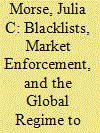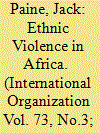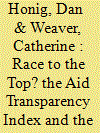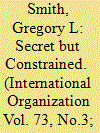|
|
|
Sort Order |
|
|
|
Items / Page
|
|
|
|
|
|
|
| Srl | Item |
| 1 |
ID:
168197


|
|
|
|
|
| Summary/Abstract |
This paper highlights how international organizations can use global performance indicators (GPIs) to drive policy change through transnational market pressure. When international organizations are credible assessors of state policy, and when monitored countries compete for market resources, GPIs transmit information about country risk and stabilize market expectations. Under these conditions banks and investors may restrict access to capital in noncompliant states and incentivize increased compliance. I demonstrate this market-enforcement mechanism by analyzing the Financial Action Task Force (FATF), an intergovernmental body that issues nonbinding recommendations to combat money laundering and the financing of terrorism. The FATF's public listing of noncompliant jurisdictions has prompted international banks to move resources away from listed states and raised the costs of continued noncompliance, significantly increasing the number of states with laws criminalizing terrorist financing. This finding suggests a powerful pathway through which institutions influence domestic policy and highlights the power of GPIs in an age where information is a global currency.
|
|
|
|
|
|
|
|
|
|
|
|
|
|
|
|
| 2 |
ID:
168201


|
|
|
|
|
| Summary/Abstract |
What explains differential rates of ethnic violence in postcolonial Africa? I argue that ethnic groups organized as a precolonial state (PCS) exacerbated interethnic tensions in their postcolonial country. Insecure leaders in these countries traded off between inclusive coalitions that risked insider coups and excluding other ethnic groups at the possible expense of outsider rebellions. My main hypotheses posit that PCS groups should associate with coups because their historically rooted advantages often enabled accessing power at the center, whereas other ethnic groups in their countries—given strategic incentives for ethnopolitical exclusion—should fight civil wars more frequently than ethnic groups in countries without a PCS group. Analyzing originally compiled data on precolonial African states provides statistical evidence for these implications about civil wars and coups between independence and 2013 across various model specifications. Strikingly, through 1989, thirty of thirty-two ethnic group-level major civil war onsets occurred in countries with a PCS group.
|
|
|
|
|
|
|
|
|
|
|
|
|
|
|
|
| 3 |
ID:
168196


|
|
|
|
|
| Summary/Abstract |
In recent decades, IGOs, NGOs, private firms and even states have begun to regularly package and distribute information on the relative performance of states. From the World Bank's Ease of Doing Business Index to the Financial Action Task Force blacklist, global performance indicators (GPIs) are increasingly deployed to influence governance globally. We argue that GPIs derive influence from their ability to frame issues, extend the authority of the creator, and — most importantly — to invoke recurrent comparison that stimulates governments' concerns for their own and their country's reputation. Their public and ongoing ratings and rankings of states are particularly adept at capturing attention not only at elite policy levels but also among other domestic and transnational actors. GPIs thus raise new questions for research on politics and governance globally. What are the social and political effects of this form of information on discourse, policies and behavior? What types of actors can effectively wield GPIs and on what types of issues? In this symposium introduction, we define GPIs, describe their rise, and theorize and discuss these questions in light of the findings of the symposium contributions.
|
|
|
|
|
|
|
|
|
|
|
|
|
|
|
|
| 4 |
ID:
168198


|
|
|
|
|
| Summary/Abstract |
Precise international metrics and assessments may induce governments to alter policies in pursuit of more favorable assessments according to these metrics. In this paper, we explore a secondary effect of global performance indicators (GPIs). Insofar as governments have finite resources and make trade-offs in public goods investments, a GPI that precisely targets the provision of a particular public good may cause governments to substitute away from the provision of other, related, public goods. We argue that both the main effect of the GPI (on the measured public good) and this substitution effect vary systematically based on the domestic political institutions and informational environments of targeted states. Specifically, we contend that both the main and substitution effects of GPIs should be largest for governments that are least accountable (opaque and nondemocratic) and should be smallest for those that are most accountable. We illustrate the logic of these arguments using a formal model and test these claims using data on primary and secondary enrollment rates across 114 countries. We find that countries substitute toward primary education enrollment rates (which is targeted by the Millennium Development Goals) and away from secondary (which is not), and that these effects are mitigated as accountability rises.
|
|
|
|
|
|
|
|
|
|
|
|
|
|
|
|
| 5 |
ID:
168200


|
|
|
|
|
| Summary/Abstract |
We argue that the World Bank has successfully marshaled the Ease of Doing Business (EDB) Index to amass considerable influence over business regulations worldwide. The Ease of Doing is a global performance indicator (GPI), and GPIs—especially those that rate and rank states against one another—are intended to package information to influence the views of an audience important to the target, such as foreign investors or voters, thus generating pressures that induce a change in the target's behavior. The World Bank has succeeded in shaping the global regulatory environment even though the bank has no explicit mandate over regulatory policy and despite questions about EDB accuracy and required policy tradeoffs. We show that the EDB has a dominating market share among business climate indicators. We then use media analyses and observational data to show that EDB has motivated state regulatory shifts. States respond to being publicly ranked and some restructure bureaucracies accordingly. Next we explore plausible influence channels for the EDB ranking and use an experiment involving US portfolio managers to build on existing economics research and examine whether the rankings influence investor sentiment within the experiment. Using a case study of India's multiyear interagency effort to rise in the EDB rankings, as well as its decision to create subnational EDB rankings, we bring the strands of the argument together by showing how politicians see the ranking as affecting domestic politics, altering investor sentiment, and engaging bureaucratic reputation. Overall, a wide variety of evidence converges to illustrate the pressures through which the World Bank has used state rankings to achieve its vision of regulatory reform.
|
|
|
|
|
|
|
|
|
|
|
|
|
|
|
|
| 6 |
ID:
168199


|
|
|
|
|
| Summary/Abstract |
Recent studies on global performance indicators (GPIs) reveal the distinct power that nonstate actors can accrue and exercise in world politics. How and when does this happen? Using a mixed-methods approach, we examine the impact of the Aid Transparency Index (ATI), an annual rating and rankings index produced by the small UK-based NGO Publish What You Fund. The ATI seeks to shape development aid donors' behavior with respect to their transparency—the quality and kind of information they publicly disclose. To investigate the ATI's effect, we construct an original panel data set of donor transparency performance before and after ATI inclusion (2006–2013) to test whether (and which) donors alter their behavior in response to inclusion in the ATI. To further probe the causal mechanisms that explain variations in donor behavior we use qualitative research, including over 150 key informant interviews conducted between 2010 and 2017. Our analysis uncovers the conditions under which the ATI influences powerful aid donors. Our mixed-methods evidence reveals how this happens. Consistent with Kelley and Simmons's central argument that GPIs exercise influence via social pressure, we find that the ATI shapes donor behavior primarily via direct effects on elites: the diffusion of professional norms, organizational learning, and peer pressure.
|
|
|
|
|
|
|
|
|
|
|
|
|
|
|
|
| 7 |
ID:
168202


|
|
|
|
|
| Summary/Abstract |
Recent international relations scholarship has argued that political elites constrain the use of military force by democracies. Despite the persuasiveness of this research, scholars have largely ignored elite dynamics’ ability to constrain the initiation of covert operations. This omission is consequential because scholars of US foreign policy often assume that covert operations serve as a substitute for the overt use of force; secrecy allows leaders to limit information to congressional elites and thus weaken their oversight capabilities. Do elite political dynamics constrain presidents’ ability to act secretly or do they affect the overt use of force only? I argue that elite political constraints—particularly opposition from Congress—extend to the president's ability to initiate covert operations. By examining the trade-off between US military force and CIA-initiated covert operations during the Cold War, I find the likelihood that covert operations are initiated decreases significantly during periods of divided government and that there is no distinguishable trade-off between covert operations and overt military force. The results suggest that constraints on covert operations became more uniform across unified and divided government following congressional oversight reforms in 1975 that reduced the information asymmetry between the majority and minority party. These findings have important ramifications for the nascent literature on back-door bargaining and covert signalling. Because democratic leaders frequently face domestic political costs even when acting in secret, covert operations should allow leaders to credibly convey their resolve.
|
|
|
|
|
|
|
|
|
|
|
|
|
|
|
|
|
|
|
|
|